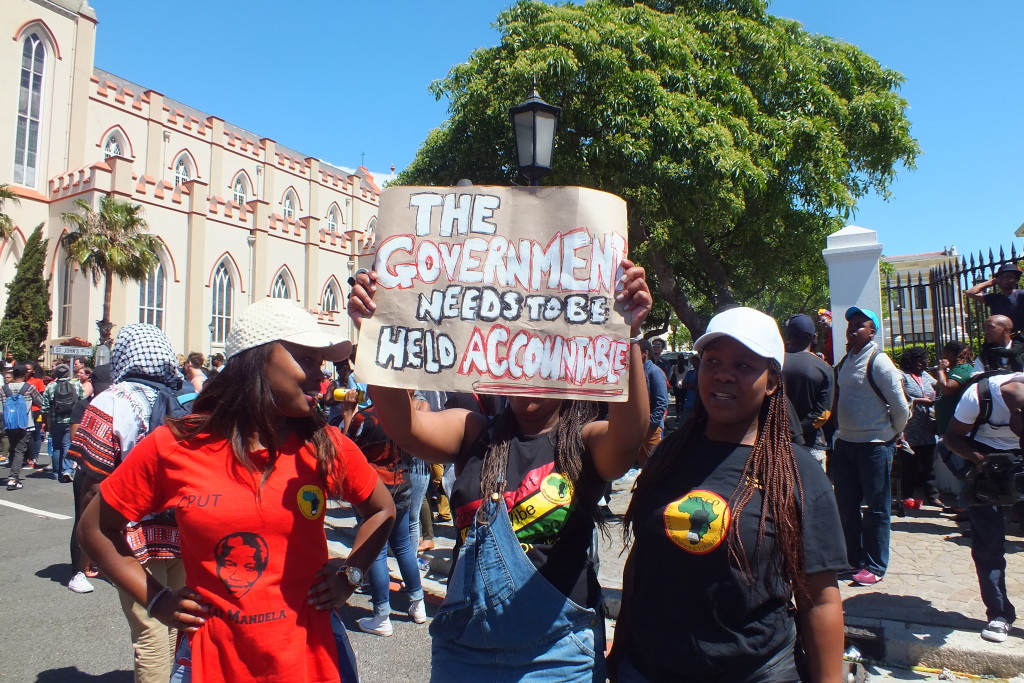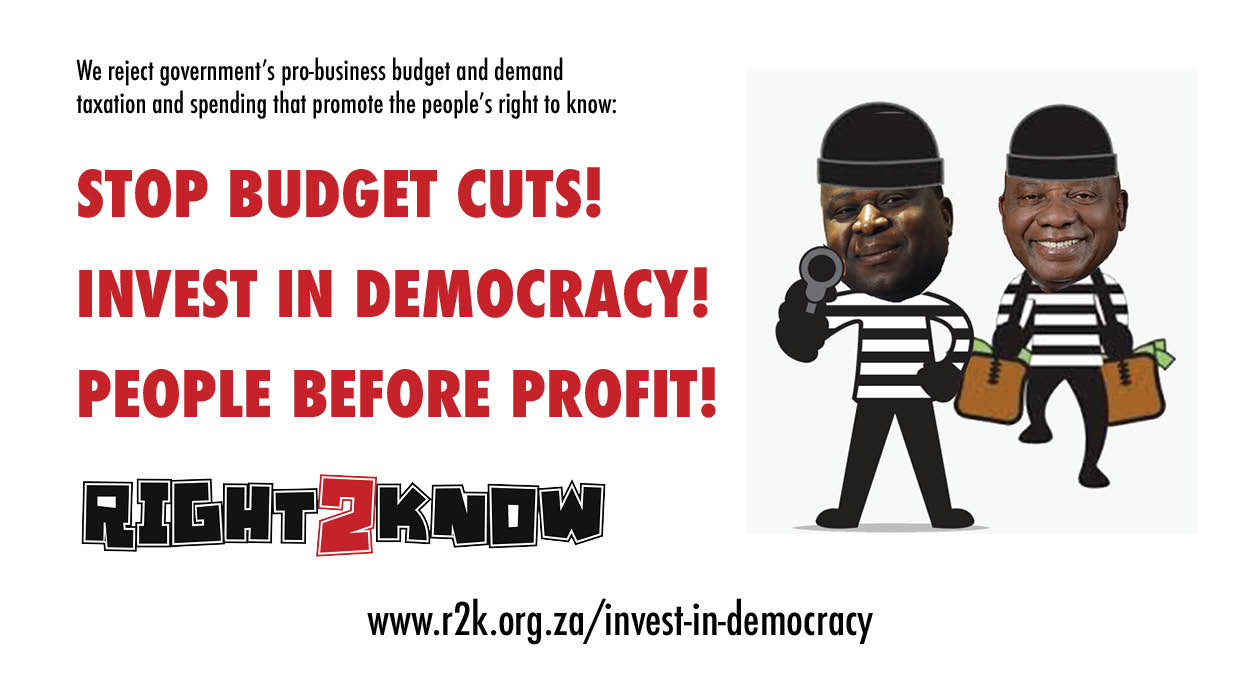STATEMENT: Stand up for democracy! Stand up for the right to protest!
Stand up for democracy! Stand up for the right to protest!

Yesterday saw another low point in our democracy with the police invoking draconian laws to punish legitimate student dissent.
Last night, two lawyers representing some of the protestors held in Bellville reported that the docket included a recommended charge of high treason. This recommended charge has now been withdrawn: appearing at the Cape Town magisrate’s court this morning, the Bellville Six face lesser but still outrageous charges of trespassing, illegal gathering, and public violence.
The other 23 arrested protestors face charges of trespassing and illegal gathering. They have all been released without bail.
Dissent is not a “threat” to state security
Despite the apparent retreat in the charges, there is very strong evidence that SAPS at least considered invoking charges of High Treason charges against six of the protesters. With this blatant intimidation, and the general brutality witnessed yesterday, the authorities show their contempt for the urgent struggle of these students to be heard. In place of a legitimate struggle to be heard and seen, all the state sees is a threat.
This paranoid and insecure view of the world is not new. Last week, a State Security official in Parliament reportedly stated that the Right2Know Campaign is an agent of a foreign government. Similar accusations have been levelled at unions like Numsa and Amcu, and people’s movements like Abahlali baseMjondolo and the Treatment Action Campaign. The same was done to the Anti Privatisation Forum, the Anti Eviction Campaign, the Landless People’s Movement and others from the late 1990s onwards.
In history, students have often played a critical role in standing up to injustice, confronting authoritarianism and revitalising democracy. Rather than demonising the emerging student movement, we welcome them as a source of hope for our ailing democracy.
Yesterday’s events are a direct result of the failure of leaders to listen to the voices and frustrations of the people for too long. The responsibility must lie with a society that has failed to give them a space to be heard and for their needs to be addressed.
It is clear society cannot ignore these voices any longer.
It is equally clear that they will not be stifled with legal threats, arrests, or physical violence. It is time to start listening.
Stop the Police Brutality!
We condemn the statement by the National Joint Operational and Intelligence Structure (NatJoints) – a structure that includes the Police, Defence and State Security – which applauded the conduct of police yesterday . The lack of responsibility for the intensely brutal assault against a restrained group of protesters could not be a more searing indictment against those appointed to protect and defend the constitution of this country.
This statement demonstrates not only a contemptuous disregard for constitutional freedoms but a growing sense of impunity for crimes committed by the police against ordinary people. By the admission of NatJoints itself, the protesters were non-violent. Yet dozens were injured and arrested.
This kind of violence and worse have been meted out on poor, black and queer bodies for years – almost always on the margins of society. Yesterday, the violence came to the centre.
The events at Parliament join a gallery of abuses alongside the arrest and detention of undocumented migrants under Operation Fiela, the massacre of workers at Marikana, the deaths in detention of Mido Macia and hundreds of others each year, and the daylight murder of Andries Tatane and scores of other protester deaths since 1994. It includes the arrest and conviction of community health workers in Bloemfontein for committing the ‘crime’ of holding a night vigil against the unaccountable Free State health department, and a similar conviction of 11 sanitation activists protesting against the City of Cape Town.
We call for the immediate suspension and disciplinary proceedings against all officers and their superiors responsible for yesterday’s attack on students.
Enable the right to protest!
Yesterday we also saw just how disabling the environment is for protest. No doubt many will be charged for contravening the Regulation of Gatherings Act. The Gatherings Act contains some important protections for the right to protest – for example, it should have protected the protesters at Parliament from the police’s unprovoked violence , but ultimately it is an outdated law that has failed to adequately promote and protect the constitutional right to protest. Under the Gatherings Act, anyone wanting to gather at Parliament yesterday to voice their demands would have had to get written permission from the Chief Magistrate up to seven days beforehand. The Act has created a series of bureaucratic hoops that people must jump through to have their grievances heard; we saw yesterday that the Act is simply not in step with the urgent need for people’s voices to be heard.
There will inevitably be a backlash in public institutions and sections of the media about the tactics of this protest and various isolated incidents, but this fails to acknowledge that the formal avenues for the expression of grievances have often become dysfunctional.
Defend the right to protest on campus!
Universities should be places where freedom of expression is sacrosanct. But this week the Universities of Cape Town and Stellenbosch rushed to court to get interim interdicts to police the right of students to protest on their campuses. As of last night, the Cape Peninsula University of Technology (CPUT) was reported to be seeking a similar court court.
As a result of these court orders, students and staff at UCT and Stellenbosch who continued to assert their right to be heard faced heightened risk of violence at the hands of police and private security. Students and workers were arrested and detained. Many were subsequently released with no charge.
This is obvious intimidation and harassment against students by both police and University management, and an assault on the freedom of expression that universities are meant to hold paramount.
At Nelson Mandela Metropolitan University, police reportedly attacked protesting students with rubber bullets and stun grenades. At Rhodes University, police reportedly used stun grenades to disperse students.
The police’s heavy-handed attacks and university management’s failure to engage students will inevitably result in conflict and escalation of tensions and do nothing to meet students’ needs and concerns. It is no coincidence that the day after these universities secured their court orders, the protests grew exponentially and spilled out to Parliament.
Stand for an open Parliament!
Yesterday’s events are also a symptom of the startling securitisation of Parliament since the2014 elections. This has included the induction of riot police into Parliament’s “civilian” security services, the interventions of State Security to intimidate and root out whistleblowers, the jamming of the signal and cutting of Parliament’s TV feed, and the repeated forceful removal of MPs from the National Assembly. This must be a Parliament for the people, built on openness and tolerance! Members of Parliament have not only allowed this to happen – each political party bears responsibility for actively creating this environment.
Defend Democracy
We stand in solidarity with students who are fighting a crucial struggle for access to higher education and an end to outsourcing of workers on campuses, and with the many organisations and individuals who have come forward to join them.
This crisis must be resolved through democratic means, with a commitment to upholding transparency and freedom of expression, and engaging students in good faith.
More than anything, South Africa needs an open, inclusive and informed debate about democratising access to higher education. A good place to start would be for the Minister of Higher Education to make public the ‘No Fees Varsity report’ which explores the feasibility of free university education for students from low-income households. We have the right to know!
###END###
Issued by the Right2Know Campaign. Organisations wishing to endorse this statement should email support@r2k.org.za



